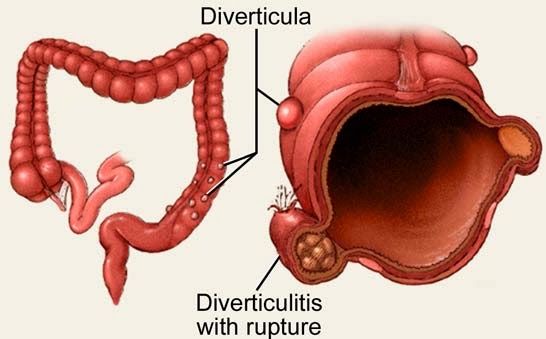Demystifying Diverticulitis: Causes, Symptoms, Treatment, and Prevention
Diverticulitis, a condition affecting the digestive system, is a source of discomfort for many. Understanding its intricacies, from its causes to treatment options, is crucial for effective management. In this in-depth guide, we will delve into the complexities of diverticulitis, offering insights into its causes, symptoms, treatment modalities, and preventive measures.
What Is Diverticulitis?
Diverticulitis manifests as inflammation or infection of diverticula, small pouches protruding from the intestinal walls, particularly within the colon. These pouches, formed due to increased pressure on weakened areas of the colon, can become irritated, leading to diverticulitis.
Causes of Diverticulitis:
Several factors contribute to the development of diverticulitis, including:
- Low-Fiber Diet: Insufficient fiber intake results in hard stools, increasing pressure in the colon during bowel movements, leading to diverticula formation.
- Aging: The likelihood of developing diverticula increases with age, primarily due to weakening of the intestinal walls.
- Obesity: Excess weight places strain on the digestive system, potentially increasing the risk of diverticulitis.
- Lack of Physical Activity: Sedentary lifestyles contribute to digestive issues, including diverticulitis.
- Genetics: Family history may predispose individuals to the condition.
- Smoking: Smoking has been linked to an increased risk of diverticulitis.

Common Symptoms:
Diverticulitis presents various symptoms, such as:
- Abdominal Pain: Typically localized in the lower left abdomen, varying in intensity.
- Fever and Chills: Infection-induced symptoms may include fever and chills.
- Nausea and Vomiting: Some individuals may experience nausea and vomiting.
- Changes in Bowel Habits: Alterations in bowel movements, including constipation or diarrhea.
- Bloating and Gas: Increased abdominal bloating and gas may occur.
Treatment Options:
Management of diverticulitis involves several approaches, including:
- Antibiotics: Antibiotics are prescribed to treat infections associated with diverticulitis.
- Pain Medication: Over-the-counter pain relievers or prescription medications help alleviate discomfort.
- Dietary Modifications: Adopting a high-fiber diet aids in softening stools and promoting regular bowel movements.
- Rest and Hydration: Adequate rest and hydration support the body’s healing process.
- Surgical Intervention: In severe cases or complications like abscesses or bowel obstruction, surgical procedures may be necessary to address the issue.

Frequently Asked Questions (FAQs):
1. What dietary changes can help prevent diverticulitis?
Consuming a diet rich in fiber, including fruits, vegetables, whole grains, and legumes, can prevent constipation and reduce the risk of diverticulitis.
2. Is diverticulitis contagious?
No, diverticulitis is not contagious. It is a non-communicable condition caused by various factors, primarily diet and lifestyle.
3. Can stress trigger diverticulitis flare-ups?
While stress does not directly cause diverticulitis, it may exacerbate symptoms or contribute to digestive discomfort.
4. Are there any specific exercises beneficial for managing diverticulitis?
Engaging in regular physical activity, including cardiovascular exercises and core-strengthening routines, can support digestive health and potentially alleviate symptoms of diverticulitis.
5. Is diverticulitis a chronic condition?
Diverticulitis can occur as an acute episode or become a chronic condition requiring ongoing management. Adhering to a healthy lifestyle and medical advice can help prevent recurrent flare-ups.
By providing comprehensive information about diverticulitis, including common questions and answers, this blog aims to educate and empower readers to recognize symptoms, seek appropriate medical care, and make lifestyle changes to manage the condition effectively. Remember, early diagnosis and intervention are key to preventing complications and improving quality of life for individuals with diverticulitis.
Also Read :
- Understanding Hemorrhoids: Causes, Symptoms, and Treatment Options
- Effective Strategies for Managing Chronic Pain: A Comprehensive Guide
- Coping Strategies for Anxiety and Depression: Practical Techniques for Mental Well-being
- What is the best diet for weight loss?
- 10 Soothing Yoga Poses for Stress Relief
- Mastering Stress: Effective Techniques for Americans to Find Balance
- Stress Less: Effective Strategies for Managing and Reducing Everyday Stressors
- Unlocking the Power of Quality Sleep: Strategies for Better Mental Health

